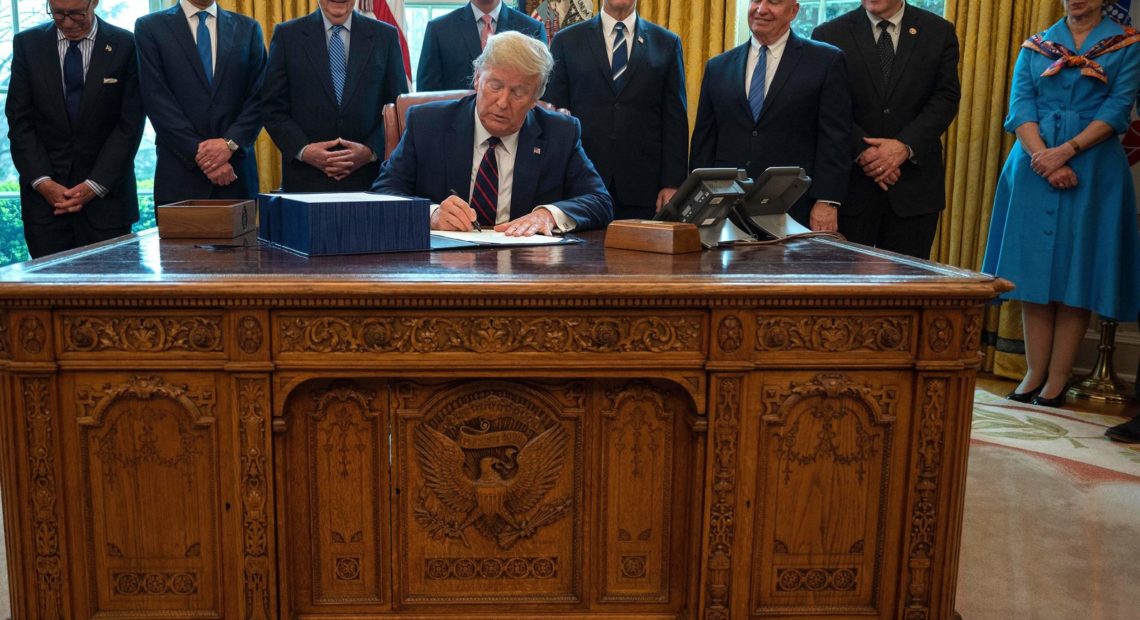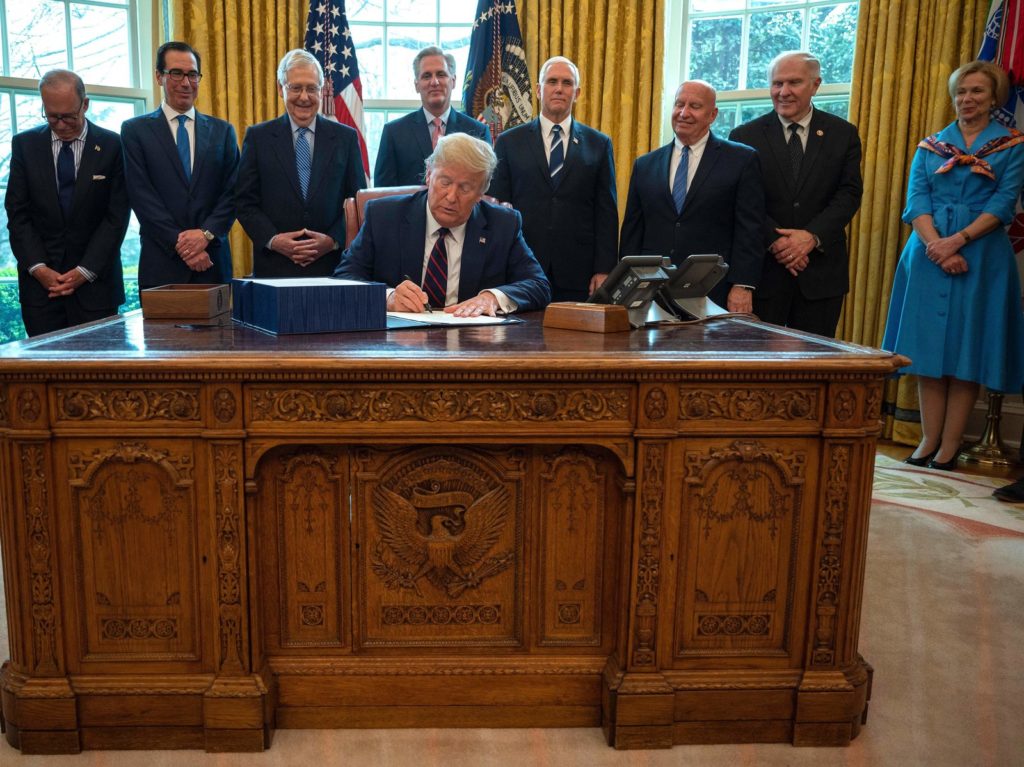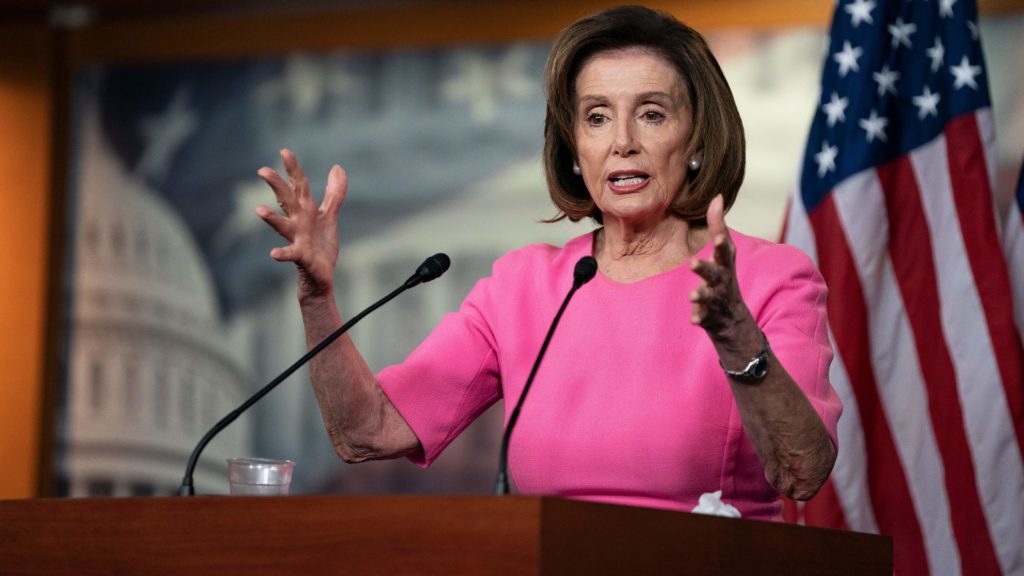
U.S. House Passes $2 Trillion Coronavirus Economic Relief Bill, Heads To President For Signature
BY CLAUDIA GRISALES, KELSEY SNELL, SUSAN DAVIS & BARBARA SPRUNT
Updated March 27, 2020, 3:50 p.m. PT
President Trump has signed a historic $2 trillion economic recovery package into law Friday afternoon, shortly after the House of Representatives approved the bill.
In an Oval Office ceremony Friday, the president thanked Republicans and Democrats “for coming together, setting aside their differences and putting America first” to pass the legislation. Trump was joined by Senate Majority Leader Mitch McConnell and House Republican Leader Kevin McCarthy. No Democrats were present at the signing.
“We’re going to keep our small businesses strong and our big businesses strong,” Trump said of the legislation. “And that’s keeping our country strong and our jobs strong.”
Trump went on to tout what he called the “greatest economy in the history of our country” prior to the arrival of the coronavirus.
“We had the highest stock price we’ve ever seen … ” Trump said. “And then we got hit by the invisible enemy and we got hit hard.”

President Trump signs the CARES act, a $2 trillion rescue package to provide economic relief amid the coronavirus outbreak, at the Oval Office of the White House on Friday.
CREDIT: Jim Watson/AFP via Getty Images
But Trump predicted a swift economic rebound.
“I really think in a fairly short period of time because of what they’ve done and what everyone’s done, I really think we’re going to be stronger than ever and we’ll be protected from a lot of this,” he said.
The package will offer relief to state and local governments, individuals, small and large businesses, and hospitals affected by the coronavirus crisis.
The bipartisan legislation, known as the CARES Act, is the third aid package from Congress this month to address the growing pandemic.
This relief package includes direct payments to Americans, an aggressive expansion of unemployment insurance and billions in business loans and aid to hospitals.
Original Story:
A historic $2 trillion economic recovery package will be sent to the president’s desk for signature after House lawmakers passed the bipartisan bill Friday afternoon.
The legislation, known as the CARES Act, is the third aid package from Congress during the growing coronavirus pandemic.
This relief package includes direct payments to Americans, an aggressive expansion of unemployment insurance and billions in business loans and aid to hospitals.
The legislation passed by voice vote, squashing an effort from Rep. Tom Massie, R-Ky., to force a recorded vote.
Our original post continues below.
Under the shadow of new, strict social distancing rules, House lawmakers began emotional debate on a historic $2 trillion rescue package on Friday to stem the economic crisis triggered by the coronavirus pandemic.

House Speaker Nancy Pelosi speaks with reporters during her weekly press conference at the Capitol on Wednesday. CREDIT: Alex Edelman/AFP via Getty Images
With many members flying into Washington “As the number of coronavirus cases in our country rises above 85,000 of our fellow citizens and continues to increase exponentially, we must take swift action,” House Majority Leader Steny Hoyer, D-Md. said on the floor.
There had been hope for a quick voice vote on Friday. However, in a midday tweet, Kentucky Republican Rep. Thomas Massie said he will call for a quorum vote, which would force a minimum of 216 members to appear in the chamber and drag out the debate — even before getting to a vote on the bill.
The move has drawn the ire of President Trump who on Friday slammed Massie in several tweets, saying he should be kicked out of the GOP. Later, Texas GOP Rep. Chip Roy tweeted that Trump should “back off” and that Massie was doing his constitutional duty in his plans to ask for a quorum.
Republican lawmakers who did travel back for the debate largely praised the effort to get relief to individuals, small businesses and hospitals as soon as possible. Even those who had reservations about the price tag said they would vote for the massive bill.
The efforts come the day after the U.S. overtook China to lead the world in the number of coronavirus cases; the U.S. had more than 86,000 as of midday Friday, and more than 1,300 have died, according to John Hopkins University.
“This is an emergency, a challenge to the conscience as well as the budget of our country, and every dollar that we spend is an investment in the lives and the livelihood of the American people,” House Speaker Nancy Pelosi, D-Calif., told reporters a day earlier on Thursday.
House Minority Leader Kevin McCarthy also lauded the plan.
“This is not another day in Congress, this is a time when we have to come together to deliver results,” McCarthy, R-Calif., said.
In a vote of 96 to 0, the Senate approved the bill late Wednesday, capping days of tough negotiations. The four senators who were not present for the vote were all self-quarantining in connection with coronavirus concerns or other illness.
House tries for quick approval
In the House, two members have tested positive for the illness and more than a dozen others remain in quarantine. As a result, House lawmakers had hoped to approve the measure on Friday with a smaller share of its more than 430 members and by a quick voice vote — a tall order for the chamber.
Massie’s plans to call for a recorded vote would scuttle that.
Already, the House is operating under new social distancing requirements. Members have been asked to use hand sanitizer and enter separately through different doors. If there is a roll call vote, members must enter the chamber in preassigned groups of 30.
“The floor will look different,” McCarthy said. “Those who are managing the bill will be further away. Members can’t sit next to each other.”
And for the first time, C-SPAN will reserve airtime to post videos from lawmakers sharing support or opposition to the bill. The move came following a request from Hoyer.
The bill could mark the largest rescue package in American history and a major bipartisan victory for Congress. In the recent days, it was the result of arduous negotiations between Senate Minority Leader Chuck Schumer and Treasury Secretary Steven Mnuchin.
Senate Majority Leader Mitch McConnell had introduced legislation last week, setting off a new wave of talks with Schumer, Mnuchin, Pelosi and McCarthy.
Trump has urged quick House approval for the plan and, on Thursday, congratulated the Senate for its efforts.
“I’m profoundly grateful that both parties came together to provide relief for American workers and families in this hour of need,” Trump told reporters Thursday evening. “The House of Republicans must now pass this bill, hopefully without delay. I think it’s got tremendous support.”
Among the key provisions in the bill:
- The plan includes $300 billion in direct payments to Americans of $1,200 or less, per person, depending on income level. Families could also receive payments of $500 per child.
- It also includes $260 billion to aggressively scale up the unemployment insurance program, expanding coverage to four months and raise the weekly benefit by $600. It would also cover nontraditional workers, including the self-employed, freelancers and those working in the gig economy.
- Another large share of the measure includes an estimated $500 billion in loans and other money for major industries, such as airlines. That provision comes with strings attached, banning use of the the funds toward stock buybacks, CEO pay boosts and other requirements.
- It also provides $100 billion to hospitals responding to the coronavirus to boost equipment and treatment
“We need more”
Once the House approves the measure, it will join the Senate in an extended recess as a result of the pandemic. But some lawmakers say their work is not done: They’ll now weigh the potential for a fourth rescue bill.
Democrats have been clear that new legislation is needed, but Republicans have been less committal. The bill before the House marks the third congressional measure this month addressing the coronavirus crisis.
“This was a big, strong step, but we need more,” Pelosi said Thursday, later adding, “there are so many things we didn’t get in any of these bills yet in the way that we need to.”
Pelosi said the next phase should involve negotiations among the “four corners,” that is herself, McCarthy, Schumer and McConnell.
She said the House could take the lead, and the next wave of legislation should focus on worker protections, medical leave, pensions, food security and additional funding for state and local governments. For example, Washington, D.C., was not treated as a state in the latest coronavirus relief bill and will lose millions as a result.
However, McCarthy and other Republicans say they want to wait.
“I wouldn’t be so quick to say you have to write something else,” McCarthy said. “Let’s let this bill work, just as long as we let the other two bills work as well. Whatever decision we have to make going forward, let’s do it with knowledge, let’s do with with experience of what’s on the ground at that moment in time.”















